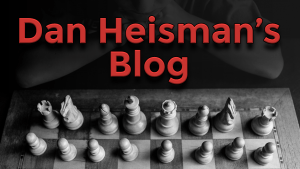The Wit and Wisdom of Louis Fogg
In mathematical logic there is a theorem which basically states "If you start with a false premise, you can prove anything."
Back in the late 1960's and early 70's, the main attraction at the Penn State Chess Team meeting often was not IM Donald Byrne. Although Coach Byrne was among the Top-10 rated chess players in the US, you had to be a pretty good, or at least decent, player to know and appreciate this. That meant that only about a dozen people on campus could really take advantage of the Coach's presence and expertise.
But some nights there were 30-40 students gathered around one chesssboard. Many of them probably did not know an underpromotion from an en passant, but periodically they would break up into gales of laughter. Just like every galaxy has its black hole at the center, this one had a large force too, but it had long, red, Afro-like, curly hair and was spinning out clever kibitzes about his blitz game, left and right:
"Don't tell him what I'm threatening!" he would say in a stage whisper, turning to the crowd behind and putting his hand up to his mouth, yet loud enough for everyone - including his opponent - to hear. "Ha, ha, ha! He might not realize the full poison of my previous move, so let's just let sleeping dogs lie! ...AHA - he fell for it! Now my dastardly plot will fall FULL FORCE upon his unsuspecting queen...!" He could keep this up for an hour or more! The crowd would be entertained by this emanating chessic vaudeville, with the opponent a sometimes willing part of the show.
Under that red hair was Louis (pronounced Loo'-ee) Fogg, and to call him a grandmaster of 5-minute (blitz) kibitzing would have been like calling Donald Byrne just an IM. Louis was clever and funny and smart, and so likeable that his opponents rarely minded the barbs.
The most common blitz opponent for Louis was David Hort, who later changed his name to David Benrexi (David's beautiful girlfriend was named Holly, which later became ironic when my first wife's name also turned out to be Holly, but that's getting away from the story).
Louis and David were both a year or so older than I, and both had Class A ratings - I think Louis might have even hit 2000 after one of his good events. Therefore, similar in age and rating, they were natural 5-minute opponents.
But there the similarity ends. David was very thoughtful, a thinking nebula compared to Louis' turbulent (and also thoughtful) black hole, and often did not mind if his clock fell so long as he paid proper homage to the chess gods by lovingly considering each "speed" move.
Louis on the other hand, would do anything in his power not to lose on time. Keeping a watchful eye on the clock, he would often drive David over on time, winning even in positions where David clearly had the advantage.
I don't know the reader's view on blitz, but I will tell you that Louis' view on blitz is the "right" one and David's is not, especially with zero increment, as all games were in the pre-digital chess age. If you watch any really strong player play blitz or even time trouble in serious games, they have a super respect for what the clock is telling them and the clock often becomes more important than the board. They would sooner jump into that black hole than purposely play too slow and lose on time in a good position, which David sometimes did against Louis.
This all came to a head one day when Louis and David were playing a double-rook endgame (each had two rooks and a bunch of pawns) in their final 5-minute encounter of the evening. David had one extra pawn on the queenside but Louis had his rooks doubled on the seventh rank. While Dave was contemplating the best way to guard f7, his flag fell.
Soon thereafter, most of the chess team was meandering out of the HUB (Hetzel Union Building) on the way for another post-meeting pizza. Dave was trailing a few feet behind Louis, who was close to me. Dave was explaining how Louis' doubled rooks were likely not enough for his extra pawn. This was not unusual; Dave didn't mind losing on time and he sometimes would let Louis know that he would have won. But this time Louis finally hit the cracking point and could not take it any more. However, he did not reply with bitterness, but instead eternal wisdom:
"But Dave...!", he suddenly spun around and confronted his lamenting opponent walking just behind,
"...Anybody Can Play Like A Grandmaster in SIX Minutes!!"
Whoa! I was stunned - if you've ever read the Pulitzer Prize-winning Godel, Escher, Bach: An Eternal Golden Braid, it's a tour-de-force full of these little logic funsies, leading up to Godel's Incompleteness Theorem (and more). Just like years later, when I heard the chess principle "Never Make a Bad Move Fast", thought about it for three days (!), and wrote The Two Move Triggers and then The Room Full of Grandmasters, I was hit harder by Louis' words than was Dave, though it did stop Dave from further recourse.
Without going into a philisophical discussion, let's just say that Louis' extemporaneous remark was a chessy way of saying "If you don't want to follow the requirements/rules, then you can do/prove anything you want". Louis wasn't a math major (his was Psychology), but I've used his quote off and on over the years, sometimes when other chess players want to prove something with faulty logic. My out-of-context, inside-joke, response:
"But anybody can play like a grandmaster in SIX minutes!"
PS: Check out my new Jan 2014 improvement column, "Filters and Masks" (free at this link til 3rd Wed in Feb). Also, I just checked in the Jan 1972 Chess Life rating list (in my attic!), covering events thru ~Aug 1971. Lou Fogg's rating had soared from about 1800 less than a year earlier to 2102 (!) and Dave Hort is listed at 1831.



